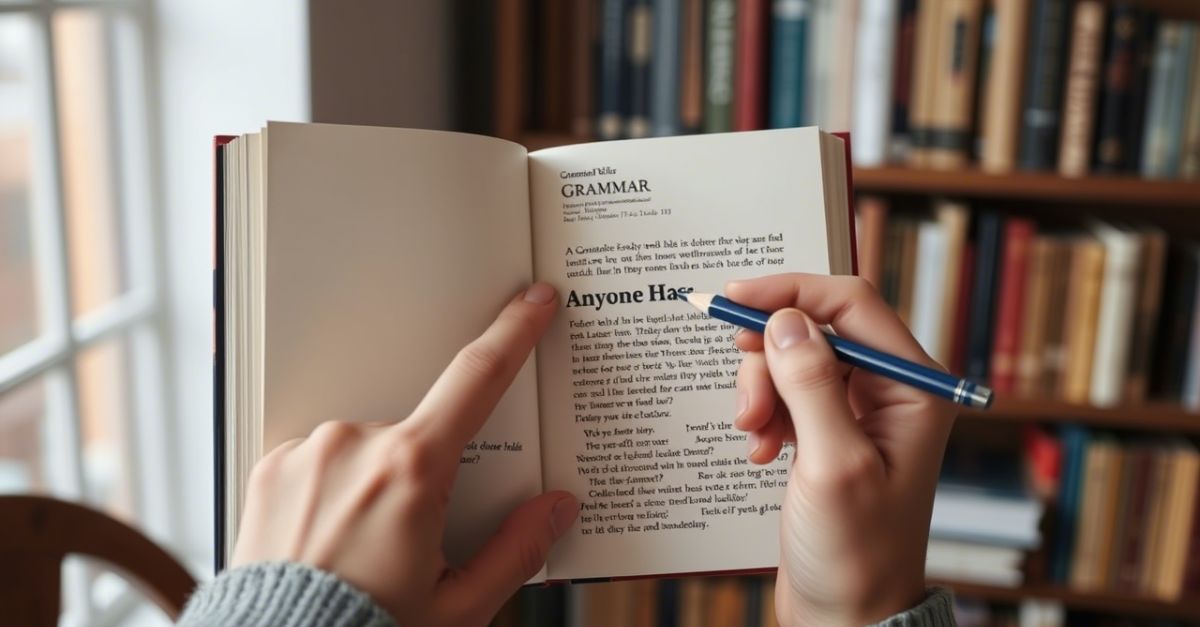English grammar has a way of throwing curveballs. One of the most common sources of confusion? The difference between “anyone has” and “anyone have.” If you’ve ever stopped mid-sentence, unsure whether to write “Does anyone have the answer?” or “Does anyone has the answer?” you’re not alone.
Let’s break it down clearly, with real-life examples, practical tips, and everything you need to master this tricky grammar point.
Understanding the Basics: Indefinite Pronouns and Subject-Verb Agreement
At the heart of this issue is something called an indefinite pronoun. Words like “anyone” and “anybody” fall into this category. Even though they may sound plural, they are actually treated as singular in formal grammar.
Rule: An indefinite pronoun like anyone takes a singular verb.
So technically, “anyone has” is correct in declarative sentences.
✅ Examples of Correct Usage with “Anyone Has”
Declarative Statement:
“If anyone has a question, please raise your hand.”
This is correct because the conditional clause “if anyone has…” treats “anyone” as singular, and the verb “has” matches the third person singular form.
Email Example (Formal):
Subject: Team Briefing Q&A
Hi Team,
If anyone has any follow-up questions after the presentation, feel free to reach out by Friday.
Best,
Marcus Froland
March 28, 2024
⚠️ Common Confusion: Why People Say “Anyone Have”

Now, let’s look at a different construction:
*”Does anyone have a pen?”
Here, even though the sentence includes “anyone have,” it’s grammatically correct because of the auxiliary verb “does.”
🔍 Auxiliary Verbs and Their Impact on Verb Form
When a sentence includes an auxiliary (helping) verb like “do/does,” the main verb that follows must stay in its base form—so you use “have,” not “has.”
Interrogative Sentence Example: *”Does anyone have experience with JavaScript?”
Incorrect: *”Does anyone has a question?”
Correct: *”Does anyone have a question?”
Syntax structure and subject-verb agreement remain intact because the helping verb “does” carries the tense.
Real-World Example: Office Email
Subject: Office Supplies Needed
Hello Team,
We’re running low on whiteboard markers and notepads. Does anyone have extras at their desk?
Thanks!
Lindsey Carson
This email feels natural and conversational—perfect for workplace communication.
🧠 NLP and Semantic Entities
In natural language processing (NLP), parsing phrases like “anyone has” or “anyone have” requires an understanding of semantic roles and syntax structure. Algorithms must recognize grammatical elements like:
- Subject-verb agreement
- Indefinite pronoun as the subject
- Presence of an auxiliary verb
Understanding these semantic categories helps machines (and humans) correctly process language, especially in tools like grammar checkers and AI-based writing assistants.
‘Anyone Has’ vs ‘Anyone Have’: A Quick Reference Table
| Sentence Type | Correct Form | Example |
|---|---|---|
| Declarative | Anyone has | “If anyone has an idea, speak up.” |
| Interrogative (with “does”) | Does anyone have | “Does anyone have extra paper?” |
| Informal/Fragment | Anyone have? | “Anyone have a charger I can borrow?” |
🗣️ Informal Speech: Grammar vs Conversation
In informal spoken English, it’s common to hear things like:
*”Anyone have a lighter?”
Technically, this is a fragment the auxiliary verb is dropped. While this is accepted in everyday English usage, especially in spoken vs written grammar, it’s best to avoid it in formal writing.
Key Grammar Concepts in Action
Let’s look at a few terms you need to understand:
- Subject-verb agreement: Ensures the verb matches the subject in number and person.
- Third person singular: “Anyone” fits here; it takes verbs ending in -s (e.g., has).
- Auxiliary verb omission: Common in speech but incorrect in writing.
- Proper usage in context: Know when formal vs informal language is acceptable.
💬 More Scenario Examples
Formal Business Email:
Subject: Event Planning Committee
Dear All,
If anyone has suggestions for the team-building event, please email them by Thursday.
Regards,
Monica Reeves
Casual Message:
“Anyone have Netflix login? Mine’s not working.”
Here, the auxiliary verb omission makes the phrase grammatically incorrect in writing—but it’s common in spoken English.
🗂 Related Grammar Topics You Should Know

- Pronoun usage and how indefinite pronouns influence verb selection
- Verb tense consistency when auxiliary verbs are involved
- Difference between possessive use (has) and general action (have)
- How to construct clear and correct interrogative sentences
🧩 Common Grammar Mistakes to Avoid
- Writing “Does anyone has…?” (Wrong verb form after “does”)
- Treating “anyone” as plural (It’s always singular)
- Using “have” after “anyone” without an auxiliary verb (in formal contexts)
🧠 Pronunciation Tips and Phonetic Awareness
While writing is the focus here, it helps to know how these phrases sound:
- Anyone has → /ˈɛn.iˌwʌn hæz/
- Anyone have (in questions) → /ˈɛn.iˌwʌn hæv/
Stress patterns shift slightly depending on sentence rhythm and auxiliary verbs, influencing communicative clarity in speech.
📚 Summary: When to Use What
- Use “anyone has” in statements or conditional clauses.“If anyone has suggestions, let me know.”
- Use “anyone have” only when paired with “does” (i.e., “Does anyone have…?”)“Does anyone have any experience with coding?”
- Avoid using “anyone have” in formal writing without an auxiliary verb.
🎯 Final Thoughts: Mastering Everyday Grammar
Getting comfortable with subject-verb consistency—especially with indefinite pronouns in English—is a big step toward true language proficiency. Whether you’re emailing your boss, chatting with friends, or writing a report, understanding the difference between “anyone has” and “anyone have” keeps your grammar sharp and your communication smooth.
Remember: Language is fluid, but grammar gives it structure. When in doubt, read your sentence aloud. If it sounds wrong, it probably is.
Want more help with English grammar rules and everyday grammar usage examples? Explore grammar tools like Grammarly or resources at Cambridge English for additional learning.
With these insights, you’ll never hesitate between “anyone has” and “anyone have” again.

Johan is an professional & experienced blogger passionate about language and writing on Grammar root. He shares his expertise in grammar, punctuation, and effective communication, making complex rules simple and accessible for readers. With a knack for clear explanations and engaging content, Steel aims to help others master the art of language.

